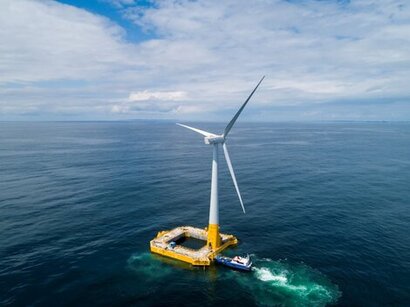
The project is funded with 2.9 million euros by ADEME as part of the French state investment plan ‘France 2030’. Currently, the replacement of major components in floating wind turbines (Major Components Replacement - MCR) is a complex operation that requires heavy lifting equipment and towing the turbines to port. The existing solutions are very expensive, both financially and environmentally.
The objective of this research project is to reduce the costs associated with the maintenance of floating wind turbines by performing these operations directly at sea. This will make floating wind energy more competitive in terms of Levelised Cost of Energy (LCOE). To achieve this, the BATSO project looks towards a technology already used in onshore wind energy, namely lifting from a crane mounted on the nacelle and developing guiding solutions along the tower.
These offshore operations will help reduce the environmental impact of floating wind turbines. The carbon footprint savings and reduction in electricity costs compared to maintenance solutions requiring towing to port will be measured and quantified.
The project will also showcase France's technological leadership in the field of floating wind energy, demonstrating the feasibility of MCR operations at sea as quickly as possible. This in turn will strengthen the position of French stakeholders in the floating wind turbine heavy maintenance market.
Planned for three years, this research and development project brings together several industrial and academic players:
BW Ideol, as the designer and builder of the Damping Pool® floating technology and maintenance provider.
Centrale Nantes, for basin testing and designing cable robot system models.
EDF Renewables, as a project developer, offshore wind farm operator, and maintenance provider.
The OPEN-C Foundation, leader in offshore testing and operator of the proposed test site.
“We are delighted to receive support from ADEME for the BATSO project” said Paul de la Guérivière, co-founder and CEO of BW Ideol. “Addressing the challenges of heavy maintenance for offshore wind turbines is crucial for establishing a robust floating wind sector in France. These new maintenance products and services, which are less costly and more environmentally friendly, can be deployed in the floating wind market at pilot and pre-commercial farms by 2027, and at commercial farms by 2030. We will make our Floatgen turbine, whose lifespan has been extended by an additional five years, available to accommodate such Research & Development projects.”
Image: A maintenance vessel docks at Floatgen, BW Ideol's first floating wind turbine in France, installed at the SEM-REV site operated by the Open-C Foundation off the coast of Le Croisic. Credits: BW Ideol/V. Joncheray
For additional information:

